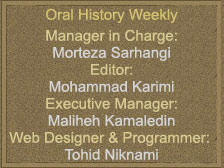| No. 226 | 1 November 2015 |
Traditional Rowzeh: A Vanishing TraditionRegardless of the quality of new mourning practices for commemorating martyrdom of Imam Hussein and his staunch companions, what matters is that traditional commemoration trends are gradually waning in the society while Shia authorities keep stressing that traditional modes of mourning for Imam Hussein must be preserved.Quran Followers Society in MashhadMuhammad Nazarzadeh, expert responsible for Oral History Department at the management of documents of Astan Quds Razavi, has reviewed and analyzed Ali Asqar Abedzadeh’s activities in a separate book entitled, Quran followers society in Mashhad: religious, educational, political, and social activities with an emphasis on Ali Asqar Abedzadeh’s efforts, in detail.Wear a tie and take a photo!Interview with Mohammad Hossain Jamalzadeh about Islamic Revolution in ArakMohammad Hossain Jamalzadeh was born in the city of Arak in 1952. His life has been knotted with important part of the history of Arak; the history of the city which has had effective and decisive men and women. His unique photos from the history of revolution of Arak’s people in the last days of Mohammad Reza Pahlavi’s rule have great historical value. With more than forty years of photographing record, He has an exquisite collection of the photos of history of Arak, lasting figures, sportsmen, theater and music artists, poets, writers, academics, physicians, and educated people of Arak. Numerous photo exhibitions from him have been launched in Arak and he still continues to register important events in the city.November 1977, Isfahan Industrial UniversityNote: Last week we reviewed memories of Mr. Nahavandi on the attack of guards to the dorm of Industrial University of Isfahan. What we have here is an interview about the same day with more details and the vents around it and other points about the event.Afshin Parto, Distinguished Gilani Historian and Scholar, died of heart attack at 66Afshin Parto (PhD), Gilani writer, editor, translator and teacher spent most of his life researching on local history and wrote about fifty books on different historical fields. Unfortunately, a large number of his books have not been published yet, and duo to his sudden death, many of his drafts are incomplete. Although his writings contained many historical issues, in intellectual circles he is considered as the historian of Jungle Movement of Gilan and Gilani Constitutional Revolution. Oral History Weekly Magazine Aims and Regulations
Oral History Weekly Magazine wishes to create a suitable place for thoughts and idea development; Its main field would be “Oral History” and subjects as telling & writing memoirs, writing diaries, travelogues, chronologies, and all other subfields of history which are presented in the form of news, articles, reports, notes, interviews and memoirs can be included. There is no limitation on the length of would-be-sent materials. Mentioning the name, academic background and email is necessary. Articles with complete references and bibliography are more credited and an abstract would quite helpful. Weekly is not about to publish any material consisting insults and libels about other people or anything that brings anxiety to public opinion. Weekly can edit and translate the received materials. The published articles and materials are only the writer’s ideas and Oral History Weekly Magazine has no responsibility about their content. |
 The next day, near noon, some kids shouted in the yard: “Mr. Samad came. Mr. Samad arrived.” The house had been crowded by lots of guests. I ran into the courtyard. Samad had come; in what a situation! Thin and weak with tousled hair and black and emaciated face. I couldn’t bring myself to greet him in front of Sediqeh, or go ahead and say something. I hid behind a few people. I threw my Chador over my face and cried. Sediqeh ran toward Samad. Crying and begging, she said: “Mr. Samad! Where’s Sattar? Where is your brother, Mr. Samad?” Samad sat on the edge of flowerbed, put his hand on his face, as if he couldn’t take it anymore. And burst into tears. I felt pity for him. Sediqeh howled and begged him: “Mr. Samad! Weren’t you the commander of Sattar, now how could I answer to his children? They say, uncle why you didn’t take care of our dad?” Everyone who had stood in the courtyard began to cry by hearing her words. Sediqeh called her children and said: “Somayeh! Leila! Come here, your uncle Samad has come. He’s brought your dad.”    |
